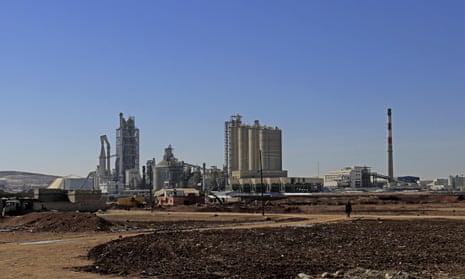The French cement giant Lafarge was charged on Thursday with complicity in crimes against humanity and financing terrorists, for allegedly paying millions to jihadists, including the Islamic State group, to keep a factory open in war-torn Syria.
The company, whose Syrian subsidiary paid the armed groups through intermediaries, has also been charged with endangering the lives of former employees at the cement plant in Jalabiya, northern Syria.
Lafarge, which has since merged with Swiss firm Holcim, immediately said it would appeal against the charges.
The French rights group Sherpa, one of the plaintiffs in the case, said it was the first time that a parent company anywhere in the world had been charged with complicity in crimes against humanity.
The allegations are the most serious against a French company in years.
A panel of three judges in Paris ordered Lafarge to hand over €30m (£27m) to authorities as a security deposit ahead of the trial.
Eight former executives, including the former chief executive Bruno Lafont, have already been charged with financing a terrorist group and/or endangering the lives of others over Lafarge’s activities in Syria between 2011 and 2015.
Lafarge is suspected of paying nearly €13m to Isis and other militant groups to keep the Jalabiya plant running long after other French companies had pulled out of Syria.
The payments by the Lafarge Cement Syria (LCS) subsidiary were considered a “tax” in exchange for which militants allowed free movement of the company’s staff and goods inside the war zone, according to investigators.
It is claimed that some of the cash was also used to buy petrol and other raw materials from suppliers close to Isis.
A source close to the inquiry said investigators also suspected that Lafarge sold cement to Isis.
Lafarge, which merged with Holcim in 2015, said it would take legal action to get the charges dropped, insisting that the company as a whole was not responsible.
“We deeply regret what happened in our Syrian subsidiary and as soon as we were informed, we immediately took firm measures,” said Beat Hess, board president of LafargeHolcim. “None of the people charged is part of the company today.”
The company acknowledged in a statement that its “supervision of its Syrian subsidiary did not allow it to identify failures arising from an unprecedented breach of internal rules and regulations by people who have left the group”.
The criminal charges “do not fairly reflect Lafarge’s responsibilities” for what happened, it added.
The Sherpa rights group hailed the decision to charge the company, saying it was “a decisive step in the fight against the impunity of multinationals operating in armed conflict zones”.
It had launched the legal case against Lafarge alongside the European Center for Constitutional and Human Rights (ECCHR) and 11 former employees.
“The activities of Lafarge in Syria, in a context where extremely violent crimes had been committed – even right outside the factory – are a perfect illustration of how multinationals can feed conflicts,” said the ECCHR legal director, Miriam Saage-Maass.
“That the courts are finally recognising the scope and seriousness of these allegations is absolutely historic.”
Several companies have previously faced allegations of complicity in crimes against humanity, though usually the cases have been dropped.
Twelve Nigerians took the Anglo-Dutch energy giant Shell to court in the US over allegations of torture and other human rights abuses in the Niger delta in the 1990s, but the supreme court blocked the case in 2013.
In 2007, France’s top administrative court said it did not have the legal authority to rule on whether state rail operator SNCF could be held responsible for the deportation of Jews during the second world war.
